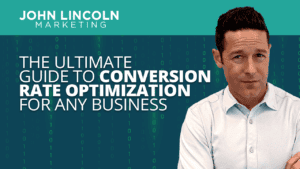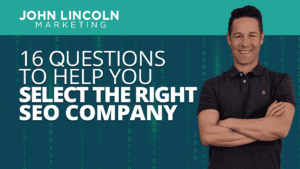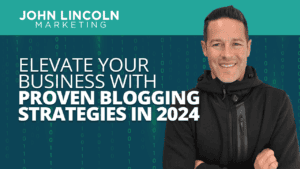
The Ultimate Guide to Conversion Rate Optimization for Any Business
Whether you’re a seasoned marketer or just starting out, conversion rate optimization (CRO) is a powerful tool that can boost your sales, leads, and overall
In 2024, choosing the right PPC company is not just about spending your advertising budget. You want to make every cent count towards your business growth. With so many options available, it’s crucial to know the right questions to ask to filter down to the best paid media company suited for your business needs.
In this blog, our CEO, John Lincoln, shares his expert insights into the top 15 questions to ask a PPC agency before hiring them, along with bonus queries to help you make an informed decision.
A top PPC agency brings a wealth of knowledge and insights. Look for a paid media agency that has a solid track record spanning over a decade, and strategic partnerships with big players like Google, Microsoft, and Meta. These relationships not only demonstrate longevity and stability but also indicate a deeper insight into the platforms that could benefit your campaigns.
The best PPC agencies employ a mix of innovative and tested strategies. They should be proficient in forecasting, media mix modeling, and advanced tracking solutions that account for the entirety of the customer journey, including offline impacts. Strategies should be tailored to your business model—whether e-commerce or lead generation.
The right agency will exhibit proficiency with advanced tools and technologies for tracking and analytics, such as Google’s offline conversion tracking for e-commerce and Meta’s CAPI, as well as third-party tools like Hyros and Triple Whale. This allows them to accurately measure and attribute sales to specific ads, refining and improving your campaigns based on solid data.
A top PPC agency will demonstrate a unique blend of success through case studies, awards and industry recognitions, and genuine client testimonials, such as 5-star reviews. Look for a PPC company that has been invited to co-host webinars with platforms like Google, indicating a strong industry presence and up-to-date knowledge. Additionally, proprietary technologies for enhanced campaign management could also set an agency apart.
Transparency is the bedrock of trust. Make sure you own all of your accounts and verify that the PPC company provides comprehensive visibility into all platforms and datasets they use. This transparency should extend to regular, in-depth reporting on campaign performance and strategic changes.
An agency with experience in your niche can better navigate industry-specific challenges and opportunities. Ask for case studies or examples of their work within your sector to gauge their understanding and experience level.
In a privacy-first digital world, leveraging first-party data effectively is key. A top PPC agency will demonstrate a sophisticated approach to remarketing and audience segmentation, ensuring that your campaigns reach the most relevant users with personalized messaging.
Diverse platform expertise is crucial for a comprehensive strategy. The agency should be able to manage campaigns across a variety of platforms that are relevant to your business, from Google Ads and Meta to emerging platforms like TikTok and LinkedIn, as well as programmatic advertising.
The best PPC agencies define performance goals and identify your main KPIs. Other tactics include tracking, reporting and ongoing data analysis and insights, forecasting and measuring ROI, and scaling the channels that work the best. This ensures you have the best media mix that works for your business to get the best return for the least amount of money.
There are so many ways to target potential customers online. The agency should explain how they use a blend of geographic, demographic, and psychographic targeting, along with continuous refinement based on performance and business objectives.
When it comes to geographic targeting, for example, it’s important to select locations based on the real-world significance to the user’s digital activity, understanding that different ZIP codes can radically influence online behavior and conversion potential.
Actual examples of recent campaigns give you insight into the agency’s creative and strategic capabilities. Request detailed case studies that include the challenges faced, strategies implemented, and the outcomes achieved.
Paid media alone is not enough – you need great landing pages, creative, email marketing, SMS marketing, and technology that supports lead nurturing – or does conversions on the e-commerce side. The right agency will understand how PPC fits into the broader digital marketing ecosystem for a holistic approach.
Clarity on financial commitments is essential. Discuss the agency’s billing practices, contract terms, and any minimum spend requirements or long-term commitments upfront to ensure alignment with your budget and expectations.
The ideal paid media company is one that proactively stays ahead of industry trends, algorithm updates, and new platform features through continuous learning and direct communication with ad platforms. This is one of many reasons why it’s important for your chosen PPC agency to have close partnerships with the big players, like Google and Meta.
Strategic adjustments are made on a spectrum—ranging from multiple times a day for extensive e-commerce campaigns to at least weekly or bi-weekly for standard operations. The frequency is tailored to campaign size, objectives, and initial performance metrics, ensuring resources are allocated efficiently for maximum impact.
In the first 90 days with a PPC company, look for a cohesive plan that outlines what the launch looks like, how quickly you’ll get started, what your spend is going to be, and who exactly you’re going to be working with. Your timeline may look something like this:
Genuine client feedback can offer invaluable insights into working with the agency. Check testimonials on their site, as well as Clutch.co, Google, etc.
By the end of the first three months, your PPC strategy is not just implemented but also fine-tuned for ongoing effectiveness and scalability.
Choosing the best PPC agency requires diligent research and thorough consideration. Armed with answers to these detailed questions, you’re well-equipped to assess and select a paid media company that aligns with your business goals and can drive meaningful results in 2024 and beyond.
Welcome to John Lincoln’s personal website. You can learn about John Lincoln’s books, films, book him to speak and contact him. John is directly associated with many of the businesses mentioned on this website and freely discloses this information.

John Lincoln is CEO of Ignite Visibility, one of the top digital marketing agencies in the nation. Ignite Visibility is a 6x Inc. 5,000 company. Ignite Visibility offers a unique digital marketing program tied directly to ROI with a focus on using SEO, social media, paid media, CRO, email and PR to achieve results. Outside of Ignite Visibility, Lincoln is a frequent speaker and author of the books Advolution, Digital Influencer and The Forecaster Method. Lincoln is consistently named one of the top digital marketers in the industry and was the recipient of the coveted Search Engine Land “Search Marketer of The Year” award. Lincoln has taught digital marketing and Web Analytics at the University of California San Diego since 2010, has been named as one of San Diego’s most admired CEO’s and a top business leader under 40. Lincoln has also made “SEO: The Movie” and “Social Media Marketing: The Movie.” His business mission is to help others through digital marketing.
Want to get in touch with John Lincoln? Click Here To Reach Out.

Whether you’re a seasoned marketer or just starting out, conversion rate optimization (CRO) is a powerful tool that can boost your sales, leads, and overall

Feeling overwhelmed by the sea of SEO companies out there? You’re not alone! Choosing the right partner is crucial for achieving your online marketing

In 2024, business blogging is not only still relevant – it’s a critical component of any content marketing strategy. Companies that blog generate 67% more